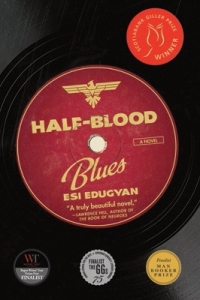 Victoria (BC, Canada) author Esi Edugyan was already getting all kinds of award nods for her second novel, Half-Blood Blues, when I finally picked it up.
Victoria (BC, Canada) author Esi Edugyan was already getting all kinds of award nods for her second novel, Half-Blood Blues, when I finally picked it up.
It locally won the Ethel Wilson Fiction Prize at the BC Book Prizes, and Edugyan was also shortlisted for the 2011 Man Booker Prize, won the 2011 Scotiabank Giller Prize and was a finalist for both the 2011 Governor General’s Award for Fiction and 2011 Rogers Writers’ Trust Fiction Prize—just to name a few.
Edugyan taps into an unexplored sliver of history: Jazz during the Nazi rule in Germany. The book has a dual narrative of the 1990s and wartime.
Berlin, 1939. A young, brilliant trumpet-player, Hieronymus, is arrested in a Paris cafe. The star musician was never heard from again. He was twenty years old. He was a German citizen. And he was black.
Fifty years later, Sidney Griffiths, the only witness that day, still refuses to speak of what he saw. When Chip Jones, his friend and fellow band member, comes to visit, recounting the discovery of a strange letter, Sid begins a slow journey towards redemption.
From the smoky bars of pre-war Berlin to the salons of Paris, Sid leads the reader through a fascinating, little-known world, and into the heart of his own guilty conscience.
From the Canadian publisher, Thomas Allen & Sons
Plagued by guilt, Sid narrates both past and present, detailing the band’s escape to Paris, their attempts to record an album, and the dangers they faced as an interracial jazz band. The pacing in the novel is brilliant—you want to find out why Hiero (aka “the kid”) was arrested, if the band ever finished their recording, and why this mysterious letter has Sid so unhinged.
Sid’s tone and language is eloquent, yet rooted in a particular style that conveys so much more than the words. The story is weighty—Black, Jewish, “deviants”, and Nazi Germany—but Edugyan manages to convey that without being heavy-handed. The story unfolds with just a guy who has lived through a lot seeking the truth about, and possibly the forgiveness of, his long lost friend.
I will admit I know next to nothing about Jazz, and I know even less about the jazz era or culture. However, despite my shortcomings, Edugyan’s writing envelopes you in the atmosphere and makes you feel like you’re part of it. The prose is not demeaning toward the ignorant, but neither does it define the slang used. You can easily infer the meanings from the context and use of jargon did not hinder the prose in any way.
SPOILER ALERT: The only thing that disappointed me was the way it ended. We are lucky enough to watch Sid’s character develop, by seeing his past and present converge in the story. Yet once we get to Poland and meet Hiero, we never really get to hear the other side of the story and his experiences. I suppose Edugyan felt it would detract from the story—it is about Sid and his actions and subsequent guilt—but all this talk about ‘the kid’ had me really craving to meet the character. END SPOILER.
- Starred review on Quill & Quire
- Winner of the 2011 Scotiabank Giller Prize
- Winner of the 2012 Ethel Wilson Fiction Prize (BC Book Prizes)
- (ETA November 2013): Half-Blood Blues has recently been chosen for Canada Reads 2014, to be defended by Donovan Bailey.





